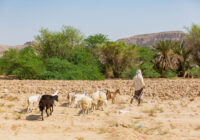In the Arab world and beyond, many young people do not see the benefit of working as learning.
Being in Jordan gives me the opportunity to focus on lessons that come from everyday experiences sometimes overlooked in the frenetic pace of living in the US. For example, during Ramadan, we are all encouraged to slow down, reflect and renew our spiritual as well as human relationships in deeper and richer ways. This is true no matter what faith you are—Ramadan is pervasive in its impact on our daily lives.
In June, I was struck, during iftar (evening meal) at a friend’s house, at how the fruit in particular seemed to be so much sweeter than in Washington, DC. I remarked on this to my friend, and he replied that everything tastes better in Ramadan because of the physical and spiritual anticipation of enjoyment that comes from fasting and prayer.
This made me think about why we eat, what we eat and how much we miss when eating becomes so routine that we lose some of our sense of taste because we are always in a hurry, on to the next activity. Ramadan enables us to slow down, appreciate everything that we have, acknowledge God’s generosity and wisdom, and the simple pleasure of sharing food together.
No less a source than the British National Health Service commented on the relationship between fasting and enjoyment. “After a few days of the fast, higher levels of endorphins appear in the blood, making you more alert and giving an overall feeling of general mental wellbeing.”
Well, some may argue that, at least on the surface, fasting does nothing for the level of patience or driving acumen of those who are fasting. Many cab drivers charge more for being on patrol during Ramadan despite having meters, making Uber much more popular!
So, where is the link between Ramadan practices and greater appreciation of one’s life?
It’s in the iftar meal that the richness of the experience of just being together, engaging in discussions ranging from the present insanity of world politics to preferred vacation destinations, and sharing foods that demand slow and thorough appreciation.
Whether one is in someone’s home or indulging in a copious buffet at a restaurant, the enjoyment of the meal, particularly after a day of fasting, signals a contentment and respite from the demands and challenges of daily lives.
That said, you’re probably wondering why I picked this theme and what this teaches me about work and enjoying the “fruits” of our labor, something that is a central goal of workforce development, which is why I am in Jordan.
If we have a taste for achieving something—in the short term it could be as simple as a new shirt, or in the longer term a vacation or a car down payment—it all begins with working. Whether we are attracted to the work at first or not, there is a clear link between our labor and our reward, much as there is between fasting and the enjoyment of food.
More importantly, when we break the fast, or when we buy the shirt, we have a sense of satisfaction that is beyond the physical act of acquiring or consuming something. There is a spiritual and moral dimension to our satisfaction that derives from knowing that we have “earned” our reward.
Labor Market
So too it is with work. What appears to be a mundane, routine, unexciting job may be exactly that, but what we are learning through that experience may enable us to see more opportunities ahead that we might not yet be able to appreciate. The human experience is one of trial and error; we learn by doing, not by sitting by and waiting for life to come to us.
This is the challenge of promoting a “culture of work” in Jordan and elsewhere in the Arab world. Low entry salaries, poor working conditions, routine tasks with little apparent future prospects, and all of the other challenges inherent in many jobs put an emphasis on “labor” rather than learning. Many young people here and throughout the world do not see the benefit of working as learning.
To make this point, there is a growing emphasis on soft skills training, career guidance and subsidies to bridge the entry of new workers. The effectiveness of these programs are limited without attending to the larger issues of adequate wages, sufficient benefits, and safe and healthy workplaces that promote retention and increase profitability, and serious government attention to enforcing policies to protect women and vulnerable communities.
If the lessons of Ramadan could be carried into the workplace, perhaps more job seekers would take the risk of entering the workforce under less than ideal conditions with the anticipation that the life lessons may just yield the sweet fruit of a successful life.
The views expressed in this article are the author’s own and do not necessarily reflect Fair Observer’s editorial policy.
Photo Credit: Miriam Mezzera
 We bring you perspectives from around the world. Help us to inform and educate. Your donation is tax-deductible. Join over 400 people to become a donor or you could choose to be a sponsor.
We bring you perspectives from around the world. Help us to inform and educate. Your donation is tax-deductible. Join over 400 people to become a donor or you could choose to be a sponsor.
Support Fair Observer
We rely on your support for our independence, diversity and quality.
For more than 10 years, Fair Observer has been free, fair and independent. No billionaire owns us, no advertisers control us. We are a reader-supported nonprofit. Unlike many other publications, we keep our content free for readers regardless of where they live or whether they can afford to pay. We have no paywalls and no ads.
In the post-truth era of fake news, echo chambers and filter bubbles, we publish a plurality of perspectives from around the world. Anyone can publish with us, but everyone goes through a rigorous editorial process. So, you get fact-checked, well-reasoned content instead of noise.
We publish 2,500+ voices from 90+ countries. We also conduct education and training programs
on subjects ranging from digital media and journalism to writing and critical thinking. This
doesn’t come cheap. Servers, editors, trainers and web developers cost
money.
Please consider supporting us on a regular basis as a recurring donor or a
sustaining member.
Will you support FO’s journalism?
We rely on your support for our independence, diversity and quality.






